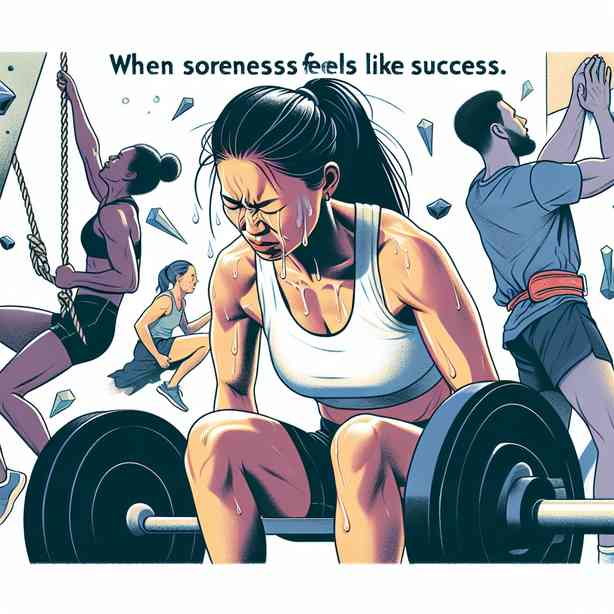
Soreness is often perceived as a negative experience; however, for many individuals, it can feel like a badge of honor or a sign of progress, especially in contexts like fitness, personal development, and emotional growth. Understanding the relationship between soreness and success can shift your perspective, offering you a new lens through which to view your challenges and achievements.
When you engage in physical activities—be it through rigorous workouts, sports, or even physical labor—soreness often follows. This phenomenon, known as Delayed Onset Muscle Soreness (DOMS), typically occurs when your muscles have been pushed beyond their usual limits. The microscopic tears that arise in your muscle fibers serve as a precursor to growth. Your body responds by repairing these fibers, making them stronger and more resilient. This physiological process exemplifies how discomfort can lead to improvement and greater physical capabilities.
In the realm of fitness, many individuals embrace the idea of “no pain, no gain.” The soreness they experience serves as a tangible proof of their effort. It becomes an achievement marker, a reminder that they’re stepping outside their comfort zone and making changes to enhance their physical fitness. This mindset encourages persistence and discipline, qualities that are essential for success not just in fitness but in various life pursuits as well.
However, it’s crucial to differentiate between productive soreness and pain that signals injury. While soreness can feel like success, push yourself to understand your body’s signals. Listening to your body’s cues is fundamental. Feeling a little discomfort is part of the journey, but if you experience sharp or prolonged pain, it’s time to reevaluate your approach. Proper rest, nutrition, and recovery practices are just as important as your workout regime in this journey of progress and success.
Soreness also extends beyond the realm of physical achievements; it can be a metaphor for emotional and psychological growth. Engaging in challenging conversations, addressing personal issues, or stepping out of your comfort zone can lead to emotional discomfort or “soreness.” Much like in physical training, this discomfort is often necessary for emotional resilience and strength. Growth in these areas often comes through discomfort; it’s the process of breaking down old patterns and beliefs to pave the way for new understanding and personal effectiveness.
When you confront challenges in your personal life, whether they are related to relationships, career, or self-image, you’re inevitably going to experience some degree of soreness. These encounters can be tough; they make you feel vulnerable, uncomfortable, or even anxious. However, confronting and navigating through such feelings can serve as a catalyst for deep personal development. The process of working through these emotions can foster resilience, improve emotional intelligence, and build a more robust sense of self.
Success, in this context, is less about the accolades and recognition you receive, and more about the growth and learning you experience from overcoming challenges. Your ability to process and work through discomfort determines your capacity to thrive in the future. Each time you push through and come out on the other side, you gain confidence and a sense of achievement. This cycle of discomfort leading to growth becomes a vital part of your character, shaping not only who you are but how you approach your future challenges.
Furthermore, the concept of “soreness as success” can be applied to professional endeavors as well. The corporate world is rife with challenges that can cause stress and discomfort. Whether it’s taking on new responsibilities, dealing with difficult colleagues, or navigating the complexities of office politics, these experiences often test your limits. However, enduring and overcoming these trials not only enhances your skill set but also positions you for advancement in your career. The discomfort associated with professional growth serves as a teachable moment, transforming challenges into opportunities for development.
Adopting a mindset that values soreness as a pathway to success can create a paradigm shift in how you view challenges in every area of your life. It invites a sense of gratitude for the struggle rather than solely focusing on the outcome. When you start seeing discomfort as part of the journey, it becomes easier to embrace challenges without shying away. You realize that every time you encounter adversity, whether it’s physical, emotional, or professional, you are being sculpted into a stronger, more capable version of yourself.
It’s essential to foster a supportive environment in which you can explore these discomforts. Surrounding yourself with positive reinforcement—be it friends, family, or mentors—can help you navigate through challenges and validate your experiences. When you share your struggles with others, it often lightens the load and transforms solitude into a shared journey of growth. Together, you can celebrate the soreness stemming from collective efforts, ensuring that the road to success feels less lonely and more vibrant.
In conclusion, soreness can indeed feel like success when you reframe how you perceive struggle, discomfort, and adversity. By understanding and embracing the idea that discomfort can lead to profound personal growth, you position yourself for a richer, more fulfilling life experience. Recognizing that every sore moment is part of a larger picture of resilience allows you to celebrate your ongoing journey. Rather than avoiding discomfort, lean into it, knowing that on the other side lies the strength and success you aspire to achieve. Embrace the soreness as a vital part of your unique narrative, transforming challenges into stepping stones toward your greater goals. As you continue on this path, you will discover that, sometimes, the most intense moments of discomfort give rise to the most fulfilling successes.


